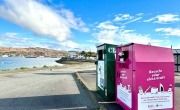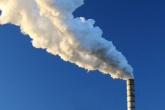Cory granted permit for London Riverside EfW plant
Last week, the government granted Cory a permit for its proposed energy from waste (EfW) plant. The new development is set to be constructed next to the company’s existing energy recovery facility in Belvedere, on the banks of the Thames. It will feature an additional energy recovery facility as well as an anaerobic digestion facility for food and green waste, solar power and battery storage.
Cory estimates that the new facility will divert up to 805,000 tonnes of non-recyclable waste from landfill and produce up to 96 megawatts (MW) of low-carbon renewable electricity. The majority of the waste will be transported via barges on the River Thames.
 Following discussions in April, Cory has secured a deal with energy company Vattenfall to provide a new development of 10,500 homes in the vicinity of the site.
Following discussions in April, Cory has secured a deal with energy company Vattenfall to provide a new development of 10,500 homes in the vicinity of the site.
Dougie Sutherland, Group CEO of Cory Riverside Energy, commented: “Currently, over two million tonnes of London’s non-recyclable waste is sent to landfill or shipped overseas, and so more domestic capacity is needed urgently. We are proud to be playing our part through the construction of this new facility.
“This represents an investment of around half a billion pounds into the UK’s infrastructure, which will be vital for rebuilding the economy after the coronavirus pandemic has eased. In the meantime, we will continue to focus on the health and safety of our staff whilst delivering the essential waste management service that the country needs during this period of uncertainty. We will support the national response to coronavirus in whatever way we can.”
Investments in in residual treatment have been a subject of intense debate, with the Chief Scientific Advisor to the Department for Environment, Food and Rural Affairs (Defra) warning against further investment in EfW capacity in the UK, arguing that this would ‘extinguish the value’ of materials and limit innovation in recycling infrastructure. This perspective is echoed in Eunomia’s 2017 report, that states a reliance on EfW could see recycling figures stagnate, as recyclable waste could be diverted into residual waste streams to make up for shortfalls in residual waste.
Anti-incineration campaign group UK Without Incineration Network (UKWIN) has consistently levelled criticism at the UK’s increasing investments in EfW. Research conducted by the group found that incinerators release vast amounts of CO2, finding that plants released 11 million tonnes of CO2 in 2017.
Commenting on the development of Cory’s new Riverside Energy Park, UKWIN National Coordinator Shlomo Dowen said: "Based on the applicant's own figures this facility would emit millions of tonnes of CO2 over its lifetime and the energy generated would have a much higher carbon intensity than gas-fired power stations. We need to be moving towards a low-carbon circular economy, and so building this incinerator would be a step in the wrong direction."
Using figures supplied by Cory, UKWIN has estimated that sending around 700,000 tonnes of waste per annum to the proposed REP incinerator would result in a relative net release of between 7 million and 10 million tonnes of CO2e over a 30 year period, compared to sending that same waste directly to landfill even when the release of methane is taken into account.
Additionally, UKWIN has calculated that Cory's existing Riverside incinerator produced electricity with a fossil carbon intensity of 617gCO2/kWh. If the proposed REP incinerator would have a similar level of carbon intensity, this would mean it would be generating electricity at nearly twice the 'fossil CO2 cost' of Combine Cycle Gas Turbine plants.








